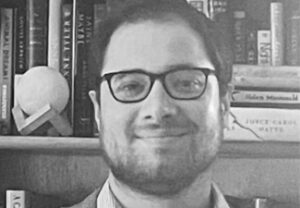
- This event has passed.
Kant & Post-Kantian German Philosophy Group Talk (Jake McNulty, Dartmouth)
Friday December 10, 2021, 3:00 pm - 5:00 pm
Event Navigation

The Kant & Post-Kantian German Idealism Group welcomes as a guest speaker Jake McNulty, a lecturer in Philosophy at Dartmouth College. His areas of interest include modern European philosophy with a focus on post-Kantian German Idealism and Marx. He was previously a Bersoff Fellow at NYU. His book, Hegel’s Logic and Metaphysics, is forthcoming from Cambridge University press, and his work has appeared or will appear in the Journal for the History of Philosophy, European Journal of Philosophy, and the Hegel Bulletin.
Please note that Jake McNulty and Nick Stang will also offer a pair of back-to-back research lectures on topics in Hegel’s science of logic the following day, Saturday, December 11. It will take place in JHB Room 401.
Talk Title
Hegel’s Methodological Monism
Talk Abstract
Though interpretations of Hegel as a monist were once common, and remain so in Germany, they have fallen on hard times in recent Anglophone scholarship. They are rejected as unduly extravagant by members of the two dominant camps of interpreters in this literature, “Kantian-idealist” and “neo-metaphysical.” In this workshop, I argue that Hegel was a monist, though I try to avoid just re-asserting orthodoxy by presenting a new argument for this interpretation. My argument is that monism is effectively entailed by Hegel’s method of deriving the categories (which is independently justified). Hegel’s monism derives initial support from the method of thinking without presuppositions, which excludes the pluralistic perspective of sense-experience [Vorstellung or Representation]. It derives further support from his procedure for deriving the categories, which, in order to avoid “wanting to swim before getting wet,” brings together criticism and use in each individual case. Incidentally, this implies that “category” is a less apt designation for Hegel’s subject-matter than “definition of the Absolute (God)”—whereas the former is one over many, the latter is one over one. Third, the course the derivation follows also implies monist sympathies: the self-contradictions in the two subordinate category-types (Being and Essence) are essentially products of pluralistic and dualistic outlooks; and they can only be resolved by a monist one. Finally, monism provides the best prospect for resolving the incompleteness of Aristotle and Kant’s tables of categories: the only provably complete number of categories is one (the Absolute Idea). In a concluding section, I look ahead to Hegel’s Realphilosophie (Natur, Geist). In both cases, I argue Hegel takes a monist approach, focusing primarily on the natural and spiritual worlds in their entirety and only secondarily on the entities making them up.
The Kant & Post-Kantian German Idealism Group is a a subgroup of the History of Philosophy Research Group, which focuses on European philosophy in Kant and post-Kantian traditions.
SHARE